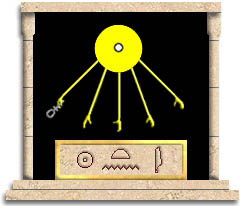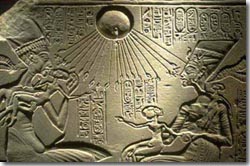| |
||||||

|
|
|||||
Translation -- "Sun Disk" |
||||||
|
||||||
However, beginning with Akhenaten's father, Amenhotep III, Aten enjoyed a higher level of worship, possibly in reaction to the growing power of the priesthood of Amun. During Akhenaten's reign, for reasons not entirely clear in the historic record, Akhenaten declared all other gods invalid and their priests useless. He ordered Egypt to worship himself as the "Sole One of Aten", who would then take the people's prayers to Aten - his 'Father'. (Akhenaten did not order the people to worship Aten; the texts state that only he was qualified to do this as Aten's intermediary). Akhenaten's religious reforms did not represent monotheism as has been often suggested, since his 'destruction' of other Gods was selective. Akhenaten |
 |
|||||
offers to Ma'at in some friezes, and some of his hymns refer to "Ra-Horus Who is in Aten". His reforms did not long outlast him. A backlash against the Atenist
movement by the priesthood of Amun-Ra after Akhenaten's death resulted
in the loss of much of this god's information. |
||||||